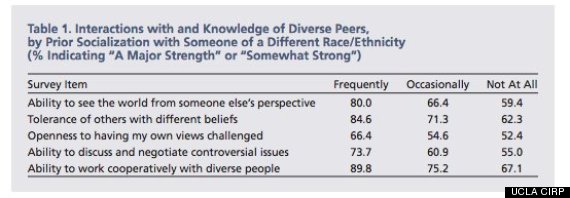
One-fourth of college students say racism is no longer a problem in the U.S., the most in the 25-year history of polling by the University of California, Los Angeles.
Just 24.7 percent of incoming 2014 freshmen said they think racial discrimination is a thing of the past, UCLA's survey of 153,015 students showed. When the question was first posed in 1990, the rate was 18 percent.
Today's college students are more ethnically diverse than in the past, the annual survey released Thursday from the UCLA's Cooperative Institutional Research Program shows. Program director Kevin Eagan said that may be why the number who think racial discrimination is no longer an issue has increased only slightly in 25 years.
"Each year, you have more students who may have been subject to discrimination in their lives," Eagan explained to The Huffington Post. "That may play out in how they view this particular issue."
Jaleesa Jones, a senior at the University of North Carolina, said she's surprised so many students think racial discrimination isn't a problem. "I think that stance is willfully ignorant," she said.

Eagan and Jones both pointed to racial tensions exposed by the killings of Trayvon Martin, Eric Garner and Michael Brown as signs that racial issues continue to fester.
"We've watched black life be devalued on a national scale this past year -- not only through police brutality, which has always been an issue but is just now becoming highly visible, but through the subsequent vilification of the victims, mostly men and women of color," Jones said.
Almost nine in 10 students who were surveyed said they are more tolerant than most. Two-thirds said there's a "very good chance" they'll socialize with friends from different racial backgrounds.
The racial composition of neighborhoods where students come from also has shifted. In 2014, 61.6 percent of freshmen were from "mostly white" or "completely white" neighborhoods, down from 86 percent in 1983.
Freshmen today are more likely to believe they have a better ability to see the world from someone else's perspective than in the past, Eagan noted. That perception of empathy, he said, "may be subsequently influencing that discrimination is still a very real issue."
